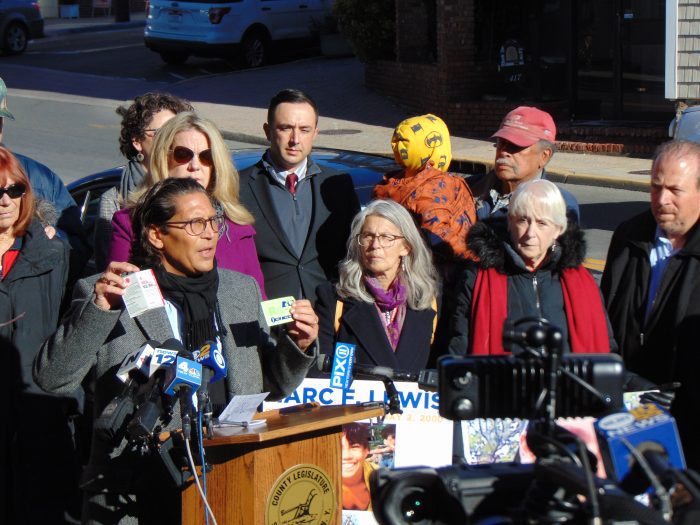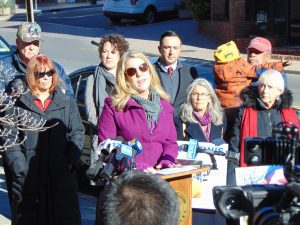Hahn, professionals and parents lead fight against local drug addiction

Suffolk County Legislator Kara Hahn (D-Setauket) joined forces with the Westbury-based Long Island Council on Alcoholism & Drug Dependence to inform residents about the increased danger of opioid-related deaths during the holiday season and the threat of street drugs.

The legislator, treatment providers and family members of those who have died from opioid-related deaths, some holding posters featuring photos of their deceased loved ones, gathered at a press conference held outside Hahn’s Port Jefferson office on Tuesday, Dec. 13.
Steve Chassman, executive director of LICADD, said the area is “rich in resources, and we are going to need them.” He listed some of the organizations that provide services 24 hours a day for those dealing with drug use and their families, such as Seafield Center of Westhampton Beach and Hope House Ministries of Port Jefferson as well as LICADD.
“We are here because it is absolutely necessary to let Long Islanders know the drug supply, not just heroin — cocaine, amphetamines, ecstasy, pressed pills — are tainted with fentanyl,” Chassman said.
He added that the death rate due to drug overdoses continues to rise, and for many families the holiday season is not a season of peace and joy.
“For families that are in the throes of substance use or opiate-use disorder, this is a time of isolation. This is a time of stigma. This is a time of financial insecurity, and we know that the rate itself, that of self-medication, increases exponentially,” Chassman said. “We’re having this press conference to let families know they’re not alone.”
Hahn said according to the Centers for Disease Control and Prevention, winter is when drug-related deaths spike, most likely due to holiday gatherings or experiencing depression during the winter season.
“The months of March, January and February, respectively, are traditionally the deadliest of the year for overdoses,” she said.
Hahn encouraged families to take advantage of the resources available to them.
“Too many families already face empty chairs at their tables, but there is always hope,” the county legislator said. “Recovery is possible.”
Carole Trottere, of Old Field, lost her son Alex Sutton to a heroin-fentanyl overdose in April 2018.
She said the U.S. Drug Enforcement Administration now refers to overdose deaths as poisoning. The DEA has stated that six out of 10 illegal pills tested had fentanyl.
“Using street drugs is the equivalent of playing Russian roulette with your life,” Trottere said. “It’s not if it will kill you, it’s when.”
Trottere advised parents not to “hide their heads in the sand.” She said to talk to their children about the dangers of drug use and to reach out to an organization for help when needed.
Anthony Rizzuto, Seafield Center director of provider relations, said, “When I first got involved in this advocacy fight, we were at about 74,000 [deaths],” he said. “We’re looking at each other, how can we let this happen? We are now at 107,000.”
This number from the CDC, for the year ending January 2022, reflects the opioid-related deaths in the U.S.
Rizzuto said one of the challenges of providing help is the stigma attached to drug use, and people being hesitant to talk about it.
“There is no shame in getting help for the disease of addiction,” he said.
He reiterated how marijuana, cocaine and fake prescription pills often are laced with fentanyl.
“If you’re not getting your medication from a pharmacy with your name on the label, please be [suspicious],” he said. “Fentanyl kills.”
For information on how to get help, visit www.licadd.org, or call the hotline, 631-979-1700.






